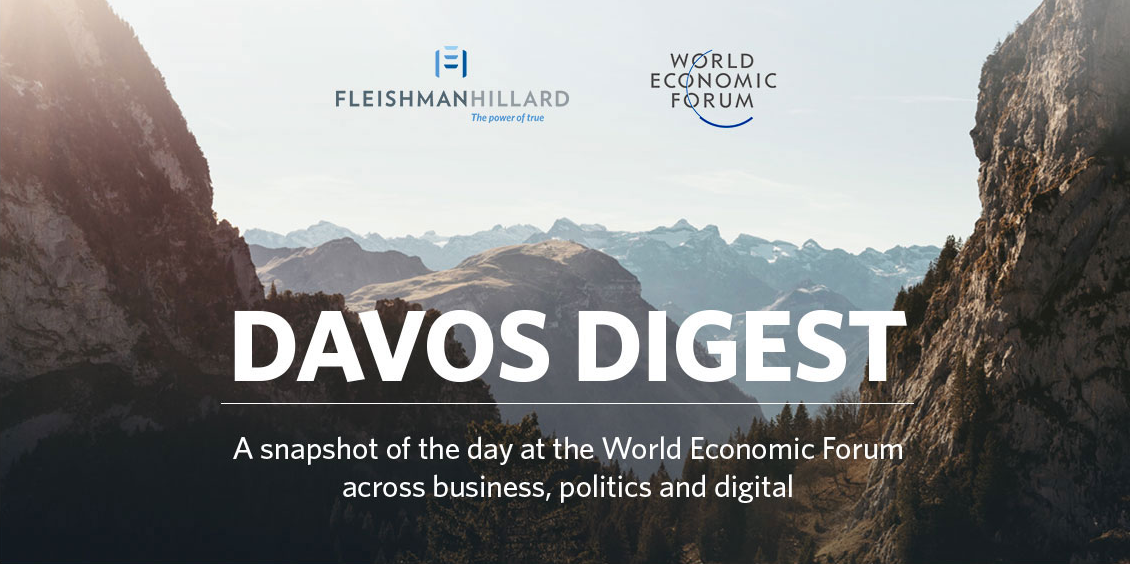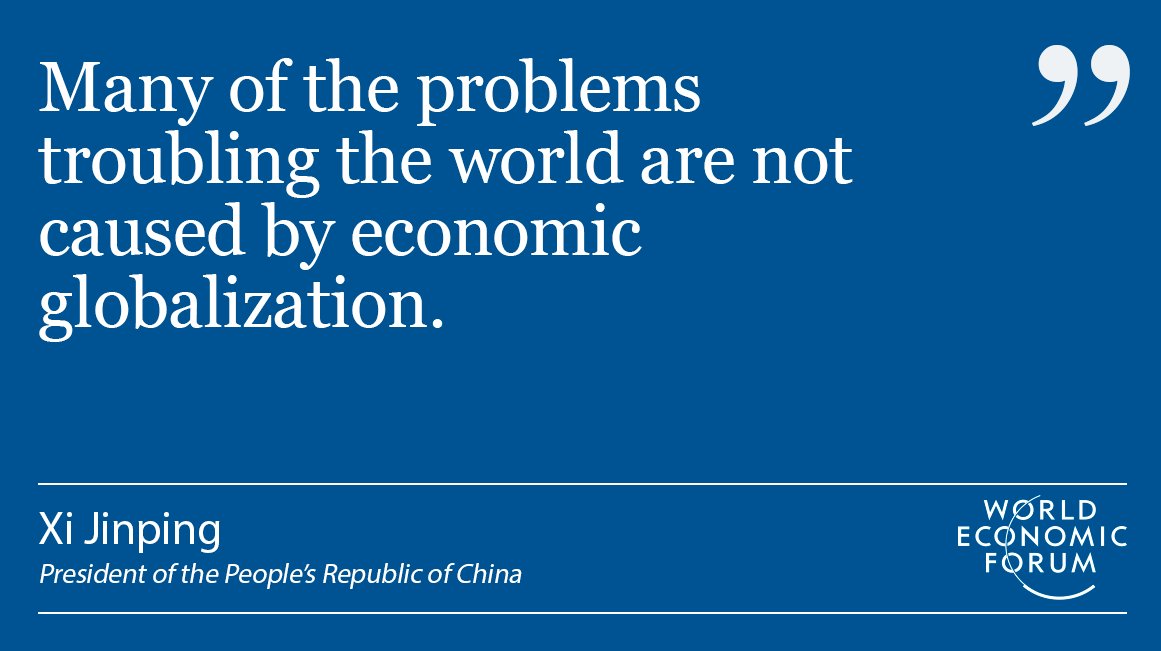Davos Digest #5

The FleishmanHillard Davos team is about to sign off for the weekend. But before we do, we’ll take a look back at the themes and outcomes from this #WEF17, as well as the day’s highlights.
Wrapping up our Davos insights from the week is our very own Head of Media, and in-house Malcolm Tucker, Peter Meikle (also FH Head of News).
Celebrity chefs, communists and a fast-changing world

Of all the people at Davos, it took Jamie Oliver, the passionate and priggish Bono of the cookery world, to spell out the worries of the globe with a simple and direct message to the very-soon-to-be President Trump: “If you cut down that garden you are cutting down hope.”
It wasn’t the Garden of Eden he was referring to. Not a tortured analogy of a potential paradise lost. No, he was talking about the veg plot at the Whitehouse, dug by the fair hands of FLOTUS.
It was just one warning among many made by the Davos bizaratti, trying to make sense of world that feels like it’s on a slippery ski slope and a whole lot more fragile and unpredictable than 12 months back.
The gathering of business leaders, politicians and a smattering of serious-minded celebs, was last year pooh-poohing thoughts of Brexit actually happening.
And not one of them was even contemplating a reality show host with a risible coiffure even becoming a candidate for President, let alone actually becoming Commander-in-Chief. Yet here we are. And Trump dominated the gathering in the Swiss resort without having to turn up.
While The Donald spent the week honing his inauguration speech (“Just say ‘fantastic’, ‘believe me’ and ‘winning’. A lot. ”), it was China’s President Xi Jingping that became the unlikely source of calm in jittery times in front of the Davos crowd.
In his opening speech, he gave a rousing defence of globalisation in the face of protectionism, stated that “no one will emerge as a winner in a trade war”, and sounded positively Dalai Lama-esque with an ovation-prompting “Let’s work together for a bright future.”
It may not have been as pithy as will.i.am’s “Let’s put our optimism goggles on” of Davos 2016 – but it’s a telling sign about the dizzying speed of change on planet Earth that the Communist leader of China can now bring more cheer to a Davos gathering than the new Leader of the Free World.
Digital & Tech
We couldn’t have a Davos tech agenda for 2017 that didn’t discuss one of 2016’s big consumer ‘drivers’…the topic of autonomous vehicles.
Attendees rolled up to a ‘Chevy’ of panel experts this morning that were discussing this latest automotive innovation this morning. The centre of debate revolved around whether society is ready for this innovation, especially following news from last year when Tesla driver Joshua Brown was involved in a fatal accident whilst using the car’s “autopilot” system. A rather interesting but dark piece of research from Yale University said that consumers prefer the idea of a car that would kill the driver or occupants rather than pedestrians. The speaker then hastened to add that “nobody’s going to buy that car!”. Quite right.
Similar to the discussion around AI, there is also concern over job losses (not least with the chauffeurs for Davos’ attendees) with almost 3% of working Americans being drivers of some sort. Most of the panelists agreed that new jobs and skills would be in demand.
Reassuringly, it seems the newly-instated Secretary General of the United Nations, Antonio Guterres, described it best. He recognised the technology’s potential to provide a “fantastic increase in wellbeing” but that without strong dialogue and cooperation between intergovernmental organisations, national governments and businesses it could end as “a nightmare for mankind”.
Exciting times ahead for the Telecoms sector too, as AT&T’s CEO Randall Stephenson opened up about the merger with Time Warner to the Wall Street Journal, claiming that “this is a classical vertical merger… we believe it’s pro-competitive”.
What’s happening at the business end?
Before we all pack our bags in search of a warmer climes, let’s start with an insight from last night’s dinner conversation between the world’s top 1%. Billionaire investor George Soros, dubbed the “man who broke the Bank of England” while profiting an estimated $1billion during 1992’s Black Wednesday had some melancholy thoughts about the economy. Soros, who many consider an investing prodigy, offered his sobering opinion over dinner claiming that markets will slump during the Trump presidency, and that our very own Theresa May will not survive long as the UK Prime Minister during the Brexit process.
A different session this morning offered a more optimistic opinion of the world’s future. Larry Fink, CEO of the world’s largest fund manager BlackRock had a slightly more upbeat view on the most divisive political events of last year from : “Whether right or wrong, they (the electorate) believed past policies were not right for them. The optimism is pretty high and from different components of our respective societies”.
Fink also pointed out that you should not bite the hand that feeds you, or in economic matters “You should be nice to your lenders. China is the US’s second largest lender.” Even the president elect cannot ignore the opinion of a man who oversees $5 trillion in assets.
The positive sentiment was further compounded by German Finance minister Wolfgang Schauble who admitted that he shed some tears on hearing the outcome of the Brexit vote but expressed his confidence that deals can be completed in the two year post article 50 period.
This is encouraging news in trading relations with the EU’s largest economy. The importance of this reciprocal trade relationship is often underplayed with the UK being Germany’s largest single import market and British drivers coveting German cars.
As the Brexit dialogue continues to take more sharp turns than the famous Fideris and Jenaz off-piste trails of Davos, British Chancellor Philip Hammond has acknowledged that Brexit uncertainty may cause firms to delay investment. Speaking at Davos he said some firms were “quite understandably… waiting for the fog of Brexit to clear”. But added that the UK economy has been quite resilient during 2016 “confounding many sceptics”. Mr Hammond reiterated that we must not forget the other strong continental relationships we have, pointing to investments by Google, Apple and Japan’s Softbank who have taken advantage of the falling pound and a rich consumer economy.
This year will certainly be a year of uncertainty with political and economic events becoming increasingly unpredictable. The questions is if the decisions, deals and conversations will actually make a difference where it matters. Most probably not, what this exclusive meeting of minds needs to do is to extend the invite to those that feel the economic impact the most. Only then will the life changing decisions and consequential change that media like to champion actually occur.
Planet of the elites: Ideas, Challenges and Leadership
Movers and Shakers in Davos 2017
Up. By far the most impressive and considered noises today came from the Chinese corner. President Xi and Jack Ma embody China’s reformist and future-gazing spirit. The Chinese premier, Xi Jinping, moved to fill the void left by West’s apparent paralysis on the global stage. Jack Ma, founder and CEO of Alibaba, delivered a scathing verdict on how the U.S. failed to convert the progress they achieved in stimulating globalisation. Xi and Ma represent the ascendance of a new global hegemon; their emphasis on climate change and on responsible rhetoric supplemented by a renewed vision of globalisation is paving their own path for a Chinese century.

Down. Multilateral institutions. Did you know there was a new UN General Secretary AND that he spoke yesterday at Davos? You could be forgiven if you didn’t. In these times of elite bashing and attacks on long-standing multilateral liberal institutions, the United Nations was not at the forefront of discussion at this year’s World Economic Forum. The EU, UN and World Bank, just to name a few, are far from the flavour of the month. In the search for grand solutions, leaders around the world are gradually pivoting away from 20th century liberal institutions and slowly towards our good old nation-states.
Confused. Britain. Brexit was never too far from delegate’s thoughts in the past few days, though, there is far from a consensus on its practical and ideological implications. Big players in the City of London have announced their desire to shift operations around in the next two years. And Chancellor Hammond thinks the great British sunshine is here to stay….once the fog fades. Though, our leader, Mrs May, is caught between a rock and a hard place. She makes sounds about corporate responsibility and the imperative to alleviate the failures in globalisation, but she runs the risk of isolating herself just when she hopes to propel Britain’s standing on the global stage.
He must not be named. Fairground goers in Davos diligently navigated around the subject of the 45th President of the United States, Donald J. Trump. In all but name he was the subject of great criticism and intrigue over the past five days. Xi, Ma, Biden, Kerry and Largarde, just to name check a few, had underlying contempt for The Donald in the subtext of their speeches.
The irony: On the road to Davos, many captains of industry took a brief stop to chat to him. The imminent and long-term impact of the 45th President is still a vagary, but it begs the question – does Trump’s rise to power mark the end of the Davos Man’s influence?

#WEF2017 is trending, but who is cutting through the noise?
Dan Brown fans rejoice! Conspiracy theorists think that Davos is actually a gathering of the Illuminati elite…
Mastercard told us that the only way to handle the disruption to traditional business practices is with true diversity with their profiling campaign and panel debate session at #WEF2017.
In ad land Publicis Groupe CEO, Maurice Levy, believes that rampant digital ad fraud can only be curbed by bringing in third-party verification of digital metrics.
Levy made the comments at a CNBC marketing panel in Davos today, amid continued concern over the reliability of digital advertising metrics. He noted that advertising agencies “are not comfortable” with being unable to access the algorithms used by digital advertising giants such as Facebook and Google.
Find Out More
-
Platinum CMS Award
March 13, 2024
-
Changing Communications Tack at Mobile World Congress
February 21, 2024


